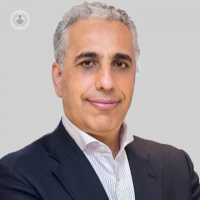Understanding and managing cyclical breast pain
Written by:In his latest online article, renowned consultant oncoplastic breast surgeon Professor Kefah Mokbel delves into cyclical breast pain. He explains the causes of cyclical breast pain, lifestyle modification that can aid pain relief and the medications available.

What is cyclical breast pain?
Cyclical breast pain, also known as mastalgia, is a common concern among women, affecting up to 70% of them at some point in their lives. This type of pain occurs in a pattern that corresponds to the menstrual cycle, typically worsening in the days leading up to menstruation and easing after its onset. It's characterized by tenderness, heaviness, or aching in one or both breasts. Interestingly, some women may also experience radiation of pain towards the arms and armpits, adding to the discomfort. The pain typically lasts for 5–7 days.
What causes cyclical breast pain?
While the exact cause of cyclical breast pain remains unclear, hormonal fluctuations during the menstrual cycle are believed to play a significant role. Changes in oestrogen and progesterone levels can lead to breast tissue swelling and inflammation, contributing to discomfort. Additionally, factors such as nutrition, psychological stress, and fluctuations in body weight may exacerbate symptoms.
Cyclical breast pain is not usually a symptom of breast cancer and the patient does not require any specific investigations. However, an ultrasound scan is sometimes requested to confirm in the case of women under the age of 40. In older women, mammography is recommended as a screening strategy.
Are there any lifestyle modifications I can make to help relieve pain?
Lifestyle modifications, such as wearing a well-fitted bra for proper support, engaging in regular exercise to reduce inflammation and improve overall well-being, maintaining a low-fat diet, optimising body weight, and practising stress-reduction techniques like meditation, may provide relief.
Recent research has shed light on potential management strategies for cyclical breast pain. Herbal remedies like nigella sativa, chamomile, flaxseed, evening primrose oil, vitex-agnus-castus, and red clover have shown promise in alleviating symptoms, thanks to their anti-inflammatory and hormonal-balancing properties. Supplements include vitamin D3, vitamin E and omega-3.
What medications are available?
Pharmaceutical options for managing breast pain are limited. Topical diclofenac gel is effective in improving symptoms. Danazol is the only drug formally approved for this purpose, but its use is often limited due to adverse effects such as weight gain, acne, and mood changes. Low-dose tamoxifen and cabergoline have shown efficacy in reducing breast pain, but they are not formally approved for this indication. However, most patients do not require any pharmaceutical drugs since symptoms tend to improve or resolve following reassurance.
By understanding the nature of cyclical breast pain and exploring various management strategies, women can take proactive steps to alleviate their symptoms and improve their quality of life.
Professor Kefah Mokbel is a renowned consultant oncoplastic breast surgeon based in London. If you would like to book a consultation with Professor Mokbel, you can do so today via his Top Doctors profile.


